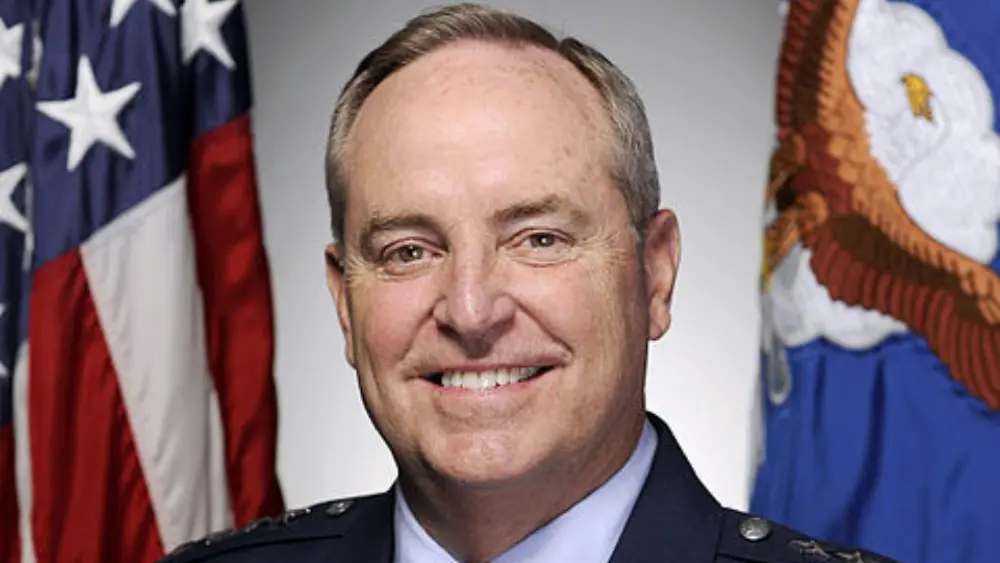General Mark A. Welsh III, born on January 26, 1953, is a highly decorated retired United States Air Force officer who left an indelible mark on the Air Force’s doctrine and strategy during his illustrious career. A visionary leader and strategic thinker, Welsh’s influence extended beyond his tenure as the 20th Chief of Staff of the Air Force.
Early Life and Education
Mark Welsh’s early life was shaped by his roots in a military family in San Antonio, Texas. Growing up amidst a backdrop of service and discipline, Welsh’s formative years instilled in him a deep-seated passion for aviation. This early exposure to the values of military life set the stage for a remarkable journey that would see him rise to prominence in the United States Air Force.
Welsh’s educational pursuits played a pivotal role in shaping his trajectory. Choosing the path of leadership and service, he attended the United States Air Force Academy, where he further cultivated his skills and knowledge. The Academy provided him with a robust foundation, not only academically but also in terms of the leadership principles that would guide him throughout his military career. This early education became the bedrock upon which Welsh built his distinguished and impactful journey within the United States Air Force.
Mark Welsh: Command Positions and Operational Leadership
Mark Welsh’s ascent through the military ranks was marked by a succession of command positions and operational leadership roles. Starting as a fighter pilot, Welsh honed his skills in the cockpit, gaining invaluable experience in the complexities of air warfare. His proficiency in this role laid the groundwork for ascending to higher command positions, where he could leverage his firsthand knowledge to shape strategic decisions.
Welsh’s journey included pivotal roles such as squadron commander, where he not only demonstrated exceptional leadership but also further deepened his understanding of the intricacies of military operations. These experiences equipped him with a unique perspective, blending operational expertise with strategic vision. His time in command positions allowed him to not only navigate the challenges of air warfare but also to contribute significantly to the development and execution of broader military strategies. The combination of his frontline experiences as a fighter pilot and his leadership roles set the stage for Welsh to bring a holistic and well-informed approach to the higher echelons of military command.
Strategic Vision as Chief of Staff
In 2012, Mark Welsh assumed the critical role of Air Force Chief of Staff, where he played a central part in defining the future vision for the Air Force during a time of profound changes. His leadership coincided with a dynamic period marked by shifting geopolitical landscapes, rapid technological advancements, and fiscal constraints. In response to these challenges, Welsh brought his strategic acumen to the forefront, steering the Air Force towards innovative approaches to doctrine and strategy.
Welsh’s tenure as Chief of Staff was characterized by a commitment to modernizing the Air Force to meet the demands of contemporary warfare. Faced with the need for adaptability in the face of emerging threats, he championed initiatives that embraced cutting-edge technologies and reshaped operational doctrines. Under his guidance, the Air Force sought to strike a balance between addressing immediate concerns and laying the groundwork for a sustainable and technologically advanced future. Welsh’s strategic vision during this pivotal period reflects not only a keen understanding of the evolving nature of warfare but also a proactive approach to positioning the Air Force as a resilient and agile force in the face of unprecedented challenges.
Mark Welsh: Emphasis on People and Culture
As Chief of Staff of the Air Force, Mark Welsh distinguished his leadership with a strong emphasis on the well-being and professional development of Air Force personnel. Understanding that a resilient and adaptable force is contingent on the morale and capabilities of its people, Welsh championed initiatives aimed at improving the quality of life for airmen. Whether through enhanced support systems for families, improved living conditions, or increased access to educational opportunities, Welsh’s focus on the human element of the Air Force underscored his commitment to fostering a thriving and motivated workforce.
In addition to prioritizing the welfare of airmen, Welsh actively cultivated a culture of innovation within the service. Recognizing the need for the Air Force to evolve in response to emerging challenges, he encouraged a mindset that embraced creativity and forward-thinking. This cultural shift aimed at empowering airmen to contribute ideas and solutions, fostering an environment where innovation could flourish. By placing a premium on both the individual well-being of Air Force personnel and the collective culture of the service, Welsh left a lasting legacy that not only strengthened the human fabric of the Air Force but also positioned it to meet the demands of a rapidly changing global landscape.
Integration of Technology and Innovation
Mark Welsh’s tenure as Chief of Staff of the Air Force was marked by a proactive approach to integrating technology and fostering innovation within the service. Understanding the pivotal role of technological advancements in modern warfare, Welsh emphasized the imperative for the Air Force to stay ahead of emerging threats. To achieve this, he advocated for strategic investments in technology and research, ensuring that the Air Force remained at the forefront of military capabilities.
Welsh’s leadership reflected a commitment to harnessing innovation as a force multiplier. Recognizing that the nature of warfare was evolving in the face of rapid technological progress, he championed initiatives that encouraged a culture of creativity and forward-thinking within the Air Force. This approach not only ensured that the service could effectively respond to contemporary challenges but also strategically positioned it to lead in the development and implementation of cutting-edge technologies. Moreover, by adopting this forward-thinking strategy, the service not only demonstrated adaptability but also underscored its commitment to staying at the forefront of technological advancements. Additionally, this proactive stance not only bolstered the service’s capability to address emerging threats but also facilitated collaboration with industry partners and research institutions. Under Welsh’s guidance, the Air Force evolved into a technologically advanced and forward-looking force, ready to navigate the complexities of 21st-century warfare.
Mark Welsh: Global Partnerships and Coalition Building
Mark Welsh, during his tenure as Chief of Staff of the Air Force, demonstrated a keen understanding of the strategic significance of global partnerships in tackling complex and interconnected challenges. Recognizing that no single nation could effectively address the evolving landscape of security threats alone, Welsh placed a strong emphasis on fostering international collaborations. He actively pursued alliances with allied air forces, seeking to build a network of cooperative relationships that transcended national borders. Through these efforts, Welsh aimed to enhance the collective capabilities of the international community, fostering a spirit of cooperation and interoperability.
Under Welsh’s leadership, the Air Force played a crucial role in building and strengthening coalitions, promoting shared objectives and mutual understanding among allied nations. He actively engaged with partners on a global scale, working to ensure that the Air Force was not only prepared to address regional challenges but was also an integral part of a broader, unified response to emerging threats. Welsh’s commitment to global partnerships reflected a strategic vision that recognized the interconnected nature of security issues and the importance of collaborative efforts in promoting global stability and security.
Advocacy for Airpower in Joint Operations
Mark Welsh emerged as a vocal and passionate advocate for the indispensable capabilities of airpower, particularly in the context of joint operations. Furthermore, his articulate arguments not only underscored the strategic significance of airpower but also resonated across military branches, fostering a broader understanding of its role in integrated defense strategies. As Chief of Staff of the Air Force, he tirelessly emphasized the critical role that airpower plays in modern warfare, highlighting its unique capacity to swiftly respond to diverse and dynamic threats. Welsh advocated to ensure that joint operations fully leveraged and acknowledged the Air Force’s contributions, emphasizing the need for a comprehensive and integrated approach to military endeavors.
In the realm of multi-domain operations, Welsh worked strategically to reinforce the Air Force’s position as a key component of U.S. military power. He recognized that the ability to control and exploit the airspace is fundamental to achieving success across various domains of conflict. By championing the distinct advantages offered by airpower and advocating for its seamless integration into joint military strategies, Welsh played a pivotal role in shaping the narrative surrounding the importance of air dominance in modern warfare. His efforts underscored the significance of airpower as a force multiplier and highlighted the essential role of the Air Force in maintaining military superiority across diverse operational environments.

Mark Welsh: Legacy and Post-Retirement Contributions
Following his 2016 retirement, Mark Welsh’s impact endured well beyond his Chief of Staff tenure. Furthermore, his lasting influence on the military landscape became increasingly apparent as time unfolded. Subsequently, his legacy continued to shape doctrine and strategy, showcasing the enduring relevance of his contributions. Moreover, as he transitioned to post-military roles, Welsh’s engagement with academia, think tanks, and advisory boards further solidified his influence on national security discourse. In addition, his continued commitment to contributing strategic insights highlighted the sustained impact of his wealth of experience. Welsh’s commitment to National Security persisted through continued contributions, showcasing his strategic insights and leaving a lasting imprint on the evolving landscape.
Welsh’s post-retirement contributions exemplified a commitment to lifelong service, showcasing a dedication to the well-being and effectiveness of the U.S. military beyond his formal role. By actively participating in institutions dedicated to the study and advancement of national security, he bridged the gap between military theory and practical application, leaving an enduring mark on the future direction of U.S. defense policy and strategy. Mark Welsh’s legacy extends as a dynamic force that transcends his active service years, impacting the ongoing evolution of military thought and preparedness in the United States.




